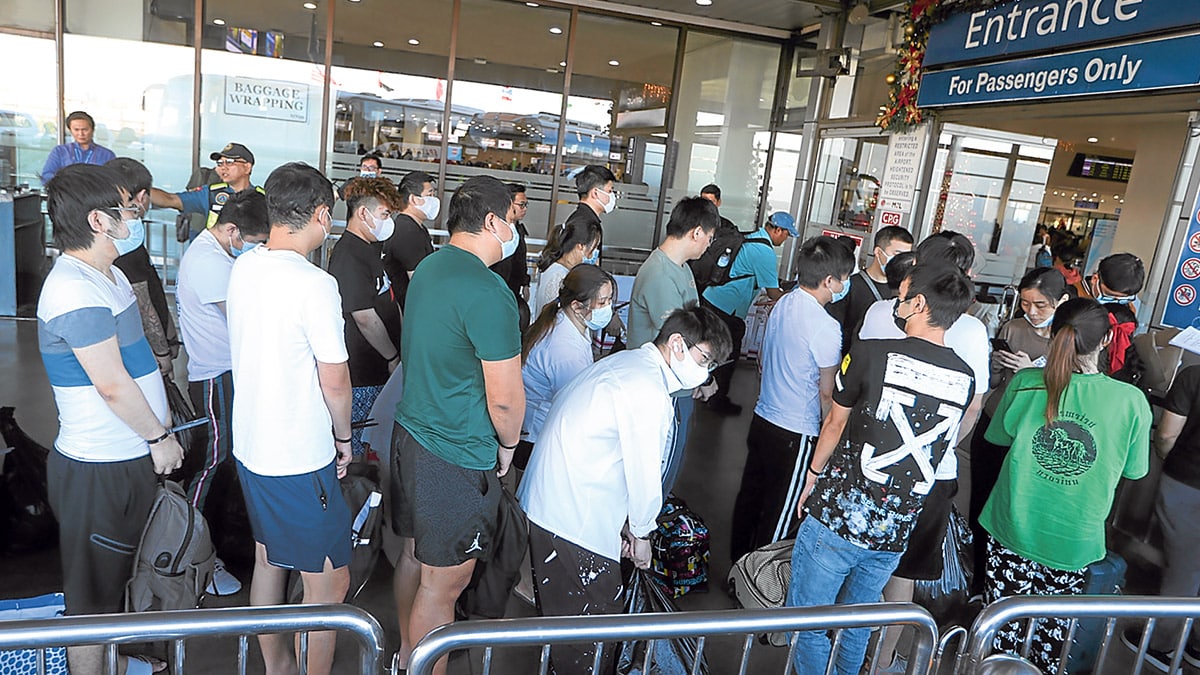Vice, gore: A peek into the sinister world of Pogo traffickers

This file photo shows the arrested Chinese nationals, who worked for a Philippine offshore gaming operator in Pasay City, at the Ninoy Aquino International Airport on December 14, 2023, as they prepare to leave the Philippines. —File photo by NIÑO JESUS ORBETA | Philippine Daily Inquirer
MANILA, Philippines —In typical business operations, security cameras or CCTVs are often installed in the corners of rooms to monitor potential illegal activities during business hours.
However, at what was then known as Smart Web Technology — a Philippine offshore gaming operator (Pogo) hub in Pasay City raided by authorities last year — the cameras were positioned directly above each row of tables, facing the employees, which suggests a more sinister purpose: bosses meticulously monitoring every move of their workers.
Inside the “model scam hub” room, there were more than just computers used for scamming activities.
The room featured striking elements such as Buddha statues, a money counter, a king-sized bed allegedly used for prostitution, smaller single beds for massage services, Chinese posters on the walls believed to bring luck, and a gong that was struck whenever quotas were met.
READ: 2024, the year of reckoning for Pogos, IGLs
Article continues after this advertisementThe situation turned darker when quotas were not achieved.
Article continues after this advertisementRemnants of horror
In such cases, the Presidential Anti-Organized Crime Commission (PAOCC) said that Pogo workers were taken to a “torture chamber” on the ground floor, where a steel bar anchored to the wall was used to restrain them with handcuffs.
More than a year after the raid, remnants of the horrors once witnessed in the room—bloodstains and footprints—remain visible.
While parts of the building have since been repurposed as offices for the PAOCC and the Department of Social Welfare and Development (DSWD), as well as the DSWD’s “Walang Gutom Kitchen,” the chamber itself has been left untouched.
President Marcos declared a total ban on Pogo operations in the country in July—recognizing the gravity of crimes tied to the Pogo industry, including scamming, human trafficking, kidnapping, extortion and violence.
The move has already yielded noticeable results, with PAOCC Executive Director Gilbert Cruz noting a significant decline in scam-related complaints.
“Last year, the number of victims who reported scams reached over 100,000. Now, it’s almost none. Even the Philippine National Police’s Anti-Cybercrime Group reports a downward trend in complaints,” Cruz told the Inquirer in an interview.
Sen. Sherwin Gatchalian, citing PNP data from June 14, noted that the peak of Pogo activities in 2019 coincided with a rise in crimes associated with their operations.
“As of May 2024, Pogo-related crimes have victimized 2,320 Filipinos (40 percent of the total victims) and 1,945 Chinese nationals (34 percent),” Gatchalian said during a forum organized by the Stratbase ADR Institute earlier this month.
Holding facility
Some victims have been staying on the top floor of the repurposed Pogo hub in Pasay, which now serves as a detention facility for foreign nationals arrested during raids—from the Clark Sun Valley hub in Pampanga in May 2023 to the latest raid in October on 3D Analyzer Information Technologies located less than a kilometer from the Senate building in Pasay City.
The PAOCC’s holding facility currently houses over 300 foreign nationals, including victims, complainants, witnesses, suspects, and others awaiting deportation. The detainees are a mix of individuals from Vietnam, Malaysia, Indonesia, Brazil and primarily China, comprising about 80 percent of the population.
All rooms, formerly Pogo workers’ quarters, are air-conditioned and equipped with toilets and bathrooms. In some rooms, the PAOCC installed double-deck beds to accommodate up to eight people.
Little modification was needed as the area was already suited to function as a detention facility, though the PAOCC reinforced some areas with barbed or military wire after escape attempts by detainees.
The commission also covers the medical services of former Pogo workers, with Wednesday designated for checkups.
‘Pogo babies’
PAOCC Deputy for Communication Emil Bugarin, who toured the Inquirer inside the former Pogo hub, said the commission is also caring for a Vietnamese woman and her baby.
Cruz said that the “Pogo babies” are among the “unwritten and unforeseen problems” they’ve had to manage.
“Every time we deport foreign nationals, here come the Pogo babies—brought by their mothers. Some mothers are even pregnant. During our last deportation, three pregnant mothers showed up,” he noted.
Online gaming operations, which have existed since 2003 in the country, saw a boom under former President Rodrigo Duterte’s administration after the Philippine Amusement and Gaming Corp. (Pagcor) issued operational guidelines for Pogos in September 2016.
At its 2019 peak, the industry employed 118,239 people and generated P8.02 billion for Pagcor.
While initially viewed as an economic opportunity, the rise of Pogos also led to rampant criminal activities, including scams, money laundering, human trafficking, prostitution, and even murder.
Pagcor Chair Alejandro Tengco said that from a high of 298 licensed Pogos in 2019, the number had dwindled to 17 as of Dec. 10, all of which were expected to cease operations today.














